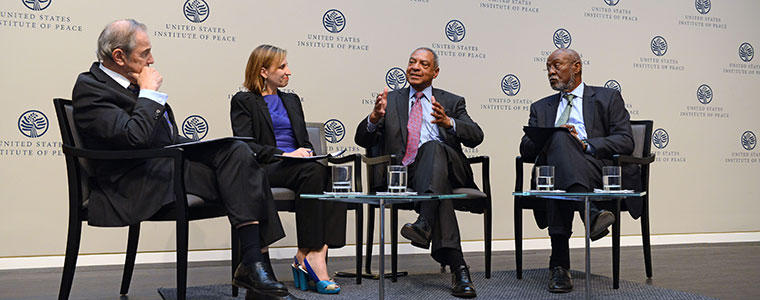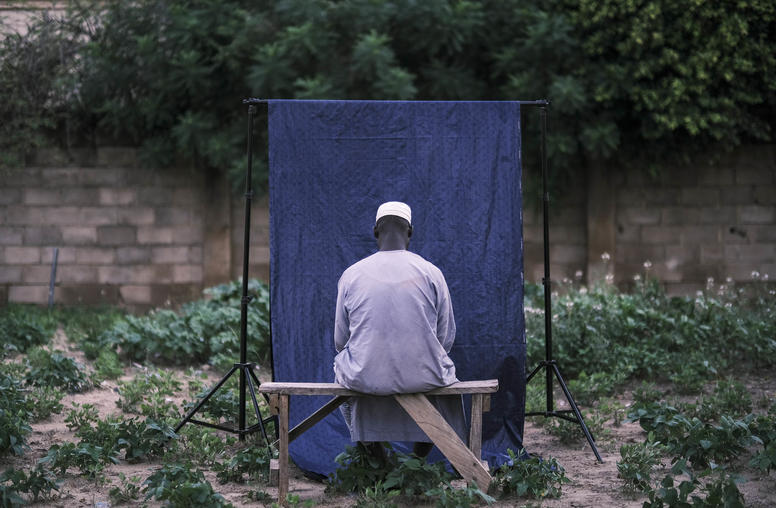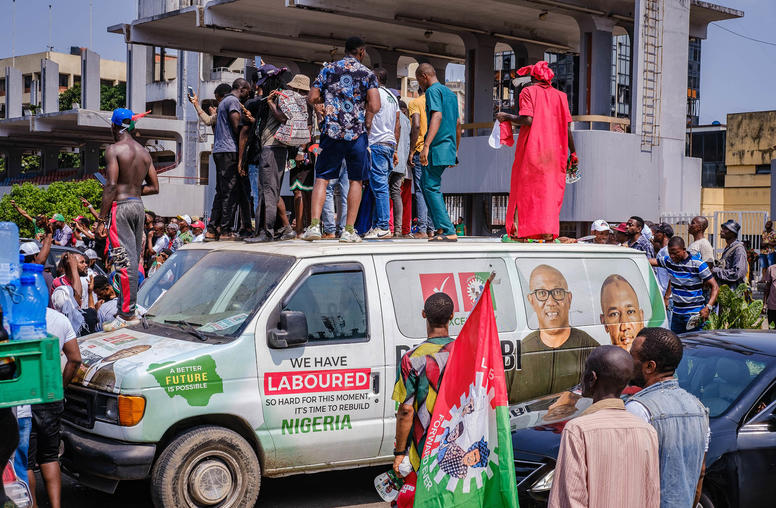U.S. Africa Summit Leaders Face Weighty Agenda for Continent
President Barack Obama and African leaders attending the first U.S.-Africa Summit in Washington next month face an array of factors undermining the democratic development and economic growth achieved on the continent in recent decades, according to three former high-level U.S. officials on Africa who spoke at the U.S. Institute of Peace.

Ambassadors Johnnie Carson, Princeton Lyman and George Moose, all of whom now are affiliated with USIP, outlined the priorities that will need to be addressed at the Aug. 4-6 Summit and beyond to achieve the improved security, governance and trade and investment that Africa needs. Leaders of most of Africa’s 54 nations will meet as a group not only with Obama but also with Cabinet members and chief executive officers of major American companies that are potential investors and trading partners.
“One of the things I would hope would come out of this Summit is a recognition that we need to be strategic in the way we assess the challenges that are facing the continent as a whole,” said Moose, who served as U.S. assistant secretary of state for Africa from 1993 to 1997 and now is vice chairman of USIP’s board of directors. The ambassadors cited violent conflict, weak institutions, corruption and violations of democratic rights among the threats. The U.S. must be “much more systematic in our own approach to how we develop the strategies for responding,” Moose said.
In an approach that is too often “piecemeal,” he said, the U.S. might fund civil society work on conflict resolution on the one hand and support certain economic efforts on the other. “If those things aren’t mutually reinforcing in some way, then they are going to be self-defeating,” he said.
Deeper economic growth
Despite boasting six of the 10 fastest-growing economies in the world, Africa generally has failed to fully transform its systems from dependency on commodity exports to an economic base that can sustain them long-term, said Lyman, citing the Africa Center for Economic Transformation, which is headed by a Ghanaian economist. Lyman served as U.S. special envoy for Sudan and South Sudan from March 2011 to March 2013 and previously had been an ambassador to Nigeria and to South Africa deputy assistant secretary of state for African affairs and assistant secretary of state for international organization affairs. He currently is a senior advisor at USIP.
Three of the six fastest-growing countries in Africa -- Nigeria, Ethiopia and Rwanda -- actually rank among the bottom of countries transforming their economies, Lyman said. Even Ghana or Botswana, considered to be strong in growth, aren’t making the fundamental changes they need to make, he said.
Stronger institutions
Among the more positive signs, Nigeria is privatizing its power sector after long delays, Rwanda is investing heavily to develop its information technology sector, and Ethiopia has made a number of changes that have produced more sustainable growth, he said.
“It’s not enough to just talk about fast-growing economies,” Lyman said. “It’s what can be done to deepen this growth into transformation.”
The U.S. can help with education-support programs and initiatives such as the “Feed the Future” agricultural-development project, and with greater emphasis on democracy and good governance, he said.
Carson, who served as assistant secretary of state for Africa from 2009 to 2013, cited a speech by Obama in Ghana during his 2009 visit, in which the president noted that strong and capable democracies not only protect individual civil rights but also property rights.
“Democracy provides a framework for individuals in countries to create and think, produce and to be able to keep the things that they produce and move forward and benefit from them,” said Carson, who now is a senior adviser at USIP.
In past 25 years, more African countries have moved toward multi-party systems, constitutional rule, free-and-fair elections and greater accountability, he said. But recent years have brought a resurgence of violence, corruption and rights violations that hamper the continent’s development.
Africa still has a number of “big men,” leaders who have been in power for 10, 20 or 30 years, Carson said. Some who are facing elections are trying to end term limits or closing political space for opposition and civil society with rights crackdowns. Some leaders also have waged assaults on the civil liberties and human rights of gays and lesbians.
“African leaders are going to push back” on U.S. talk of improving governance and restoring civic rights, Carson said. “African democracy is not sufficiently strong that it cannot be toppled.”
The scourge of violence
Moose said he’s particularly concerned about the rash of violence across the continent, from insurgencies and terrorism to day-to-day criminality and domestic abuse.
“In my 40 years in dealing with the continent, I have never seen more pervasive violence than we see right now today,” said Moose, who also previously served as a U.S. ambassador to Benin and Senegal and on three occasions as a U.S. representative to the United Nations. “The violence is what threatens to undermine all of the progress we seek to achieve.”
Countries also need to deal with issues of peace, justice and reconciliation after conflict, such as in South Sudan, Lyman said. Each country has to determine how to address these issues in the way most suitable and sustainable for their own societies, he said.
Civil society’s role
USIP Senior Program Officer Susan Stigant, who will become director of the Institute’s Africa programs in September, said justice tends to be looked at narrowly in terms of a particular issue.
“Many of these countries are also facing challenges for general justice systems to ensure that there is justice in the future as part of the reform, as part of democracy and governance processes,” Stigant said in the July 22 discussion.
Stigant and Moose also said the U.S.-Africa Leaders Summit is not only for political and business leaders, but also an opportunity for U.S. and African civil society, the diaspora and other private-sector leaders to discuss governance, transparency, labor, trade and investment.
The U.S. government’s Young African Leaders Initiative, launched by Obama in 2010, is one potential source of advancement for the continent, Carson said. Some 500 young leaders were selected from among 50,000 applicants and are taking a modified executive leadership course at 20 universities around the U.S., and the program aims to increase the number of participants to 5,000, he said.
In the meantime, Carson said he hopes the U.S. administration will be able to reaffirm its historic support for Africa at the Summit, and that the current African leaders will see the U.S. as a “genuine partner” in resolving conflicts and improving economic development and governance.



